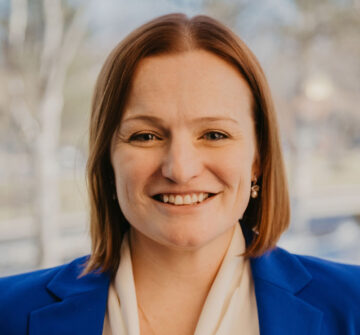Awardee Projects Target Health Disparities, Fostering Research and Solutions that Promote Health Equity in Massachusetts
Watertown, MA – Yesterday, Interim Secretary of Economic Development Ashley Stolba and Massachusetts Life Sciences Center (MLSC) President and CEO Kirk Taylor, MD joined life sciences and health equity leaders to announce the awardees of the MLSC’s Health Equity Accelerator. Five projects will receive awards of $50,000 targeting health disparities, fostering research, and solutions that promote health equity in Massachusetts.
“Massachusetts leads in life sciences and health care innovation, but it is important to make sure that residents can benefit from the leading research breakthroughs happening here,” said Interim Secretary of Economic Development Ashley Stolba, who serves as co-chair of the MLSC’s Board of Directors. “These MLSC Health Equity Accelerator projects will help to close the health care gap and lengthen our state’s global leadership by advancing critical research and improving patient care.”
The MLSC Health Equity Accelerator program is designed to advance health equity in underserved communities. Massachusetts-based non-profit and for-profit organizations receive support through this program to develop life sciences-driven solutions that reduce disparities and address unmet healthcare needs. By focusing on innovative approaches in the life sciences, participants can help promote health equity and improve healthcare outcomes.
“The Health Equity Accelerator offers an exciting leap forward for MLSC’s programming as we look to implement the next chapter of the Life Sciences Initiative,” said MLSC President and CEO Kirk Taylor, MD. “We will build upon these projects with health equity as a foundational sinew to our strategy over the next decade. We are incredibly proud to support these efforts as they offer transformative solutions to a more equitable healthcare and life science ecosystem.”
Officials celebrated the announcement during a visit to the Howe Innovation Center at Perkins, an ecosystem support center that is amplifying real-world accessibility problems by connecting DisabilityTech innovators and investors to end users to build a more accessible world. The Howe Innovation Center works collaboratively to centralize primary market research and user testing with the disability community for corporates, startups, and universities. In 2024 BostInno recognized the Howe Innovation Center at Perkins with a Fire Award for its success in advancing the Boston startup ecosystem through collaborations with local and national organizations, including Amazon, MIT, MassChallenge and the Museum of Science.
“At Perkins, we believe the future of innovation must center the human experience—and that starts with designing alongside people with disabilities from day one,” said Sandy K. Lacey, Executive Director of the Howe Innovation Center at Perkins. “Massachusetts is already home to the second-largest number of DisabilityTech startups in the country, and we’re on a mission to make our innovation ecosystem the most accessible in the world. We’re proud to collaborate with the Massachusetts Life Sciences Center to accelerate breakthroughs that are not only visionary, but equitable—ensuring technologies today are born accessible.”
At part of its mission to accelerate innovation, the Howe Innovation Center at Perkins launched a “Startup in Residence”, a pilot incubator program for DisabilityTech startups in Massachusetts. Tatum Robotics, a Health Equity Accelerator awardee, which has also received funding through the MLSC’s MassNextGen Initiative and utilizes the Center’s internship programming, is Howe’s first startup in the pilot program.
Last November, Governor Maura Healey signed into law the Mass Leads Act, an economic development bill building on the success of the state’s renowned life sciences sector while also underscoring the importance of pairing innovation with health equity.
A 2023 report from the Blue Cross Blue Shield Foundation highlighted $1.4 billion in avoidable healthcare spending, $1.3 billion in lost labor productivity, and $3.2 billion from premature death, underscoring the urgent need for systemic equity reforms. Moreover, Black, Indigenous, and People of Color (BIPOC) are underrepresented in clinical trials and medical research, which leads to biased clinical algorithms and a lack of effective treatments for underserved communities. Funding for drug discovery often neglects diseases that primarily impact these populations, exacerbating health inequities. Additionally, barriers such as cost, insurance coverage, and geographic location further limit access to innovative therapies. The MLSC will support and incentivize projects that target these disparities, fostering research and solutions that promote health equity in Massachusetts.
Health Equity Accelerator Awardees ($250,000):
Awardee: Yuhan Lee, Brigham and Women’s Hospital
Award Amount: $50,000
Project Title: Developing a Novel Topical Solution to Prevent the Spread of Tick-Borne Diseases
The project aims to develop a first-in-class topical solution that prevents the spread of tick-borne diseases (TBDs), which disproportionately impact historically marginalized communities. By addressing this unmet healthcare need, we are taking a proactive approach to protecting vulnerable populations and reducing health disparities. The innovative solution focuses on prevention, making it an accessible and impactful tool for advancing health equity.
Awardee: Stephanie Carreiro, University of Massachusetts Chan Medical School
Award Amount: $50,000
Project Title: Digital Health Tools for Enhancing Health Equity in SUD Care
This project proposes the use of a digital heath tool (RAE cHealth) to identify barriers to technology engagement and substance use disorder (SUD) recovery in underserved populations, connect users with their peer recovery coach and other critical support systems, and empower users to be self-sufficient drivers of their own recovery. UMass Chan Medical School will engage individuals in recovery from SUD who are engaged in peer recovery services to use the RAE cHealth app/sensor for 30 days with their peers. A central peer recovery professional/health coach will serve as the program navigator to on-board clients and peers and provide real time support. UMass Chan will collect patient-centered and healthcare utilization outcomes that measure efficacy of the intervention and demonstrate value to potential future payers, which will enhance sustainability.
“Digital health tools offer an incredible opportunity to transform patient care, especially for individuals with substance use disorders (SUD),” said Stephanie Carreiro, Associate Professor of Emergency Medicine and Director of the Tox(In)novation Lab at UMass Chan Medical School. “However, without thoughtful design, these tools risk exacerbating existing health disparities, particularly for those from socioeconomically disadvantaged backgrounds who may face challenges with access or digital literacy. Thanks to the support from the Massachusetts Life Sciences Center, we can directly address these concerns. Our project will actively involve peer recovery coaches and individuals with lived experience of SUD in refining our digital intervention. This collaborative approach ensures our tool is not only effective but also equitable, leading to better outcomes for everyone.”
Awardee: Maithri Ameresekere, Boston Medical Center
Award Amount: $50,000
Project Title: Reducing Perinatal Mental Health Inequities through Screening and Engagement
The project aims to improve mental health screening and referral to pre-existing culturally sensitive, trauma-informed perinatal mental health services embedded in the OBGYN department at Boston Medical Center (BMC). Black, Indigenous, and People of Color (BIPOC) experience higher rates of perinatal mood and anxiety disorders (PMADs), such as depression, anxiety, and posttraumatic stress, and often face multiple barriers to care. By identifying mental health concerns early through screening and linking patients to existing tailored support, BMC strives to reduce disparities in connection to perinatal mental health services, while addressing barriers to screening and referral that can be replicated in other healthcare settings that serve diverse communities. The goal is to advance health equity by reducing disparities in perinatal mental healthcare access, improving the well-being of parents and their children.
Awardee: Valencia Koomson, Tufts University
Award Amount: $50,000
Project Title: An Innovative Oximetry Sensor to Advance Health Equity
The project goal is to eliminate racial bias in one of the most important medical devices for blood oxygen assessment — the pulse oximeter. An inadequate supply of oxygen to the body can quickly lead to permanent, irreversible damage to vital organs and death. Pulse oximeters are one of the most widely used medical devices in the world to measure blood oxygen levels. Decades of studies and recent FDA warnings have raised awareness to the inaccuracies of these devices for patients with dark skin pigmentation. Tufts University is developing a bias-free pulse oximeter to advance health equity for all populations. Its innovative pulse oximeter technology will provide a high precision blood oxygen measurement device to improve care throughout all healthcare settings.
“As an engineer and a woman of color, I understand firsthand how critical it is for medical technologies to serve everyone equally,” said Valencia Koomson, Associate Professor of Electrical and Computer Engineering at Tufts University. “This award from the Massachusetts Life Sciences Center allows us to take a meaningful step toward solving a long-standing problem—pulse oximeters that don’t work accurately on all skin tones. I’m proud to lead a team that’s designing medical device technology centered on equity, impact, and inclusion.”
Awardee: Samantha Johnson, Tatum Robotics
Award Amount: $50,000
Project Title: DeafBlind Care Access: Providing DeafBlind Individuals Access to Independent Communication in Healthcare
Tatum Robotics’ products aim to transform healthcare for the DeafBlind community with tactile robotic devices. By integrating with patient portals, scheduling tools, and long-term care settings, the Tatum T1 enables autonomous interaction for DeafBlind individuals, addressing barriers that often lead to misdiagnoses and delayed care. Designed for accessibility, it ensures that users can navigate healthcare independently in their primary language, tactile American Sign Language (ASL). These tools also address broader gaps identified in global research, such as the lack of communication training among healthcare providers and the frequent reliance on family members to mediate medical interactions. By promoting dignity and equity, the Tatum T1 aligns with the mission to create scalable, sustainable health equity solutions for underserved populations.
“Tatum Robotics was beyond honored to receive a MLSC Health Equity Award surrounded not only by Massachusetts leaders, but also our community at the Perkins School,” said Samantha Johnson, Founder & CEO of Tatum Robotics. “Understanding the intersection of disability tech and health equity is the start to creating a more inclusive state for all. We are thrilled to use this award to fund our research into making the healthcare experience more accessible for those who have been greatly impacted by funding and personnel cuts in clinics.”
About the Massachusetts Life Sciences Center
The Massachusetts Life Sciences Center (MLSC) is an economic development investment agency dedicated to supporting the growth and development of the life sciences in Massachusetts, home to the most verdant and productive life sciences ecosystem in the world. Through public-private funding initiatives, the MLSC supports innovation, research and development, commercialization, and manufacturing activities in the fields of biopharma, medical devices, diagnostics, and digital health. Since its creation in 2007, the MLSC has strategically deployed more than $1 billion in Massachusetts, through a combination of grants, loans, capital infrastructure investments, tax incentives and workforce programs. These investments have created thousands of jobs and propelled the development of new therapies, devices and scientific advancements that are improving patient health and well-being in Massachusetts and beyond.
###



